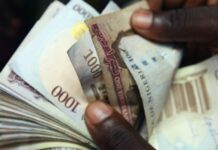Nigerians’ consumption expenditure was driven by rising inflation to N57.08tn in the first half of 2022.
This is a 14.39 per cent increase from the N49.89tn that was spent in the corresponding period of 2021, according to the ‘Nigerian Gross Domestic Product Report (Expenditure and Income Approach)’ report by the National Bureau of Statistics.
The NBS defined household final consumption expenditure as spending, including “imputed expenditure, incurred by resident households on individual consumption goods and services. This is calculated as a residual.”
The agency further disclosed that household final consumption grew by 6.94 per cent and 17.64 per cent in Q1 and Q2 2022 respectively, on a year-on-year basis, in real terms.
It stated that the growth rates were lower compared to those of the corresponding quarters of 2021, which recorded 47.16 per cent and 42.40 per cent respectively.
It said, “The observed trend since 2020 indicates that real household consumption expenditure declined in Q1 and Q2 accounting for negative growth rates informed by the COVID-19 pandemic.
“However, positive growth rates were recorded in Q3 and Q4 of 2020 as well as the four quarters of 2021. As the economy recovers from the shock of the pandemic, Q1 and Q2 2022 growth rates have shown lower rates relative to the corresponding quarters of 2021.
“On a quarter-on-quarter basis, real household consumption expenditure grew by -8.50 per cent in Q1, and 2.32 per cent in Q2 2022. In nominal terms, household final consumption expenditure grew by 8.14 per cent in Q1, and 20.99 per cent in Q2 2022.”
In its report, the NBS revealed that household consumption accounted for 76.79 per cent of real GDP at market prices in Q1 2022, and 78.99 per cent in Q2 2022, leaving little for investments and others.
According to the Organization for Economic Co-operation and Development, household spending was the amount of final consumption expenditure made by households to meet their everyday needs such as food, clothing, housing (rent), energy, transport, durable goods, health costs, leisure, and miscellaneous services.
It added that it was about 60 per cent of GDP and was an important variable for economic analysis of demand.
Since 2021, headline inflation rose from 16.47 per cent in January 2021 to 18.60 per cent as of June 2022. It rose further to 18.60 per cent in September 2022.
In its September inflation report, the NBS stated that the disruption in the supply of food products, increase in import cost due to the persistent currency depreciation, and the general increase in the cost of production were driving higher prices for goods and services.











